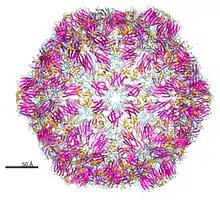Nepovirus
Nepovirus is a genus of viruses in the order Picornavirales, in the family Secoviridae, in the subfamily Comovirinae. Plants serve as natural hosts. There are 40 species in this genus.[1][2] Nepoviruses, unlike the other two genera (Comovirus and Fabavirus) in the subfamily Comovirinae, are transmitted by nematodes.[3]
| Nepovirus | |
|---|---|
 | |
| Crystal structure of Grapevine Fanleaf Virus | |
| Virus classification | |
| (unranked): | Virus |
| Realm: | Riboviria |
| Kingdom: | Orthornavirae |
| Phylum: | Pisuviricota |
| Class: | Pisoniviricetes |
| Order: | Picornavirales |
| Family: | Secoviridae |
| Subfamily: | Comovirinae |
| Genus: | Nepovirus |
| Species | |
Taxonomy
The genus contains the following species:[2]
- Aeonium ringspot virus
- Apricot latent ringspot virus
- Arabis mosaic virus
- Arracacha virus A
- Artichoke Aegean ringspot virus
- Artichoke Italian latent virus
- Artichoke yellow ringspot virus
- Beet ringspot virus
- Blackcurrant reversion virus
- Blueberry latent spherical virus
- Blueberry leaf mottle virus
- Cassava American latent virus
- Cassava green mottle virus
- Cherry leaf roll virus
- Chicory yellow mottle virus
- Cocoa necrosis virus
- Crimson clover latent virus
- Cycas necrotic stunt virus
- Grapevine Anatolian ringspot virus
- Grapevine Bulgarian latent virus
- Grapevine chrome mosaic virus
- Grapevine deformation virus
- Grapevine fanleaf virus
- Grapevine Tunisian ringspot virus
- Hibiscus latent ringspot virus
- Lucerne Australian latent virus
- Melon mild mottle virus
- Mulberry mosaic leaf roll associated virus
- Mulberry ringspot virus
- Myrobalan latent ringspot virus
- Olive latent ringspot virus
- Peach rosette mosaic virus
- Potato black ringspot virus
- Potato virus B
- Potato virus U
- Raspberry ringspot virus
- Soybean latent spherical virus
- Tobacco ringspot virus
- Tomato black ring virus
- Tomato ringspot virus
Structure
Viruses in Nepovirus are non-enveloped, with icosahedral geometries, and T=pseudo3 symmetry. The diameter is around 28-30 nm. Genomes are linear and segmented, bipartite, around 23.9kb in length.[1]
| Genus | Structure | Symmetry | Capsid | Genomic arrangement | Genomic segmentation |
|---|---|---|---|---|---|
| Nepovirus | Icosahedral | Pseudo T=3 | Non-enveloped | Linear | Segmented |
Life cycle
Viral replication is cytoplasmic. Entry into the host cell is achieved by penetration into the host cell. Replication follows the positive stranded RNA virus replication model. Positive stranded RNA virus transcription is the method of transcription. The virus exits the host cell by tubule-guided viral movement. Plants serve as the natural host. The virus is transmitted via a vector (nematodes, mite, and thrips). Transmission routes are vector.[1]
| Genus | Host details | Tissue tropism | Entry details | Release details | Replication site | Assembly site | Transmission |
|---|---|---|---|---|---|---|---|
| Nepovirus | Plants | None | Viral movement; mechanical inoculation | Viral movement | Cytoplasm | Cytoplasm | Nematodes; mites; thrips |
Genome
Nepoviruses are classified as type IV viruses under the Baltimore classification system, and consequently contain bipartite, linear, single stranded positive sense RNA genomes. The two genome segments are encapsulated separately into two different icosahedral particles. Each of the genome segments produces a different polypeptide, which undergoes a series of steps (i.e. proteolysis, and other post-translational modifications) in order to produce a functional protein.[3]
RNA1
The first segment (RNA1) is approximately 8,000 nucleotides in length and appears as a single copy in each B type virion. It encodes the proteins that are important in replication and is the first gene to be activated.[3]
RNA2
The second segment (RNA2) is approximately 4,000–7,000 nucleotides in length and usually appears as a single copy in each M type virion. It encodes the proteins that are important in cell-cell transmission and evasion of cellular defenses.[3]
References
- "Viral Zone". ExPASy. Retrieved 15 June 2015.
- "Virus Taxonomy: 2020 Release". International Committee on Taxonomy of Viruses (ICTV). March 2021. Retrieved 21 May 2021.
- "Notes on Genus: Nepovirus". Retrieved 6 August 2007.
External links
- Viralzone: Nepovirus
- ICTV
- UniProt Taxonomy